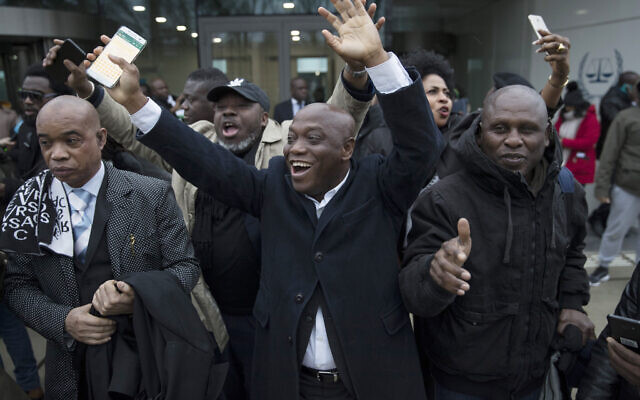The International Criminal Court’s member countries were set to elect a new chief prosecutor for the war crimes tribunal on Friday, a grueling job whose current holder is under US sanctions.
Four candidates from Britain, Ireland, Italy and Spain are vying to replace outgoing prosecutor Fatou Bensouda, who has led controversial probes into the Israeli-Palestinian conflict and Afghanistan.
Britain’s Karim Khan is said to be in pole position ahead of Carlos Castresana of Spain, Ireland’s Fergal Gaynor and Italy’s Francesco Lo Voi, according to British media reports.
The ICC’s member states have failed to reach a consensus despite several attempts in recent weeks, and will now vote on the new prosecutor at the United Nations in New York.
Gambian-born Bensouda is due to step down in June after nine years in one of the most challenging jobs in international justice, with a mixed record of success at the Hague-based court.

Chief prosecutor of the International Criminal Court Fatou Bensouda at the opening of the court’s judicial year with a Special Session at the seat of the court in The Hague, January 23, 2020. (courtesy ICC)
Whoever becomes the court’s third prosecutor since its formation in 2002 will be taking on a bulging file of difficult cases at a tribunal whose legitimacy is constantly under attack.
‘Unacceptable’ sanctions
British lawyer and human rights specialist Khan has been a defense lawyer in several ICC cases, including for late Libyan leader Muammar Gaddafi’s son Seif al-Islam.
Khan recently headed a UN special probe into Islamic State group crimes and called for trials like those of Nazi leaders at Nuremberg.
Spain’s Castresana, a judge by training, previously headed a UN panel combating crime and corruption in Guatemala, but resigned in 2010 alleging “systemic attacks” by power-hungry officials.
Ireland’s Gaynor has previously represented victims of crimes at the ICC, in probes including the Afghan war investigation, and a case against Kenyan President Uhuru Kenyatta.
Sicilian prosecutor Lo Voi meanwhile has led cases against Italy’s Mafia and a major people-smuggling network.
The new prosecutor’s first tasks will include deciding the next steps on the probe into war crimes in Afghanistan and the hugely contentious investigation into the 2014 Israel-Palestinian conflict in Gaza.
In a major decision last Friday, a pre-trial chamber of the ICC determined that The Hague has jurisdiction to open a criminal investigation into Israel and the Palestinians for war crimes alleged to have taken place in the West Bank, Gaza Strip and East Jerusalem, paving the way for a full investigation after a five-year preliminary probe opened by Bensouda.
Bensouda indicated in 2019 that a criminal investigation, if approved, would focus on the 2014 Israel-Hamas conflict (Operation Protective Edge), on Israeli settlement policy and on the Israeli response to Hamas-led protests at the Gaza border.
Israel and the United States — neither of which are ICC members — have strongly opposed the probe into alleged war crimes by both Israeli forces and Palestinian terrorist groups.
Israeli Prime Minister Benjamin Netanyahu said of the ruling: “Today the ICC proved once again that it is a political body and not a judicial institution. The ICC ignores the real war crimes and instead pursues the State of Israel, a state with a strong democratic government that sanctifies the rule of law, and is not a member of the ICC.”
“In this decision,” Netanyahu added, “the ICC violated the right of democracies to defend themselves against terrorism, and played into the hands of those who undermine efforts to expand the circle of peace. We will continue to protect our citizens and soldiers in every way from legal persecution.”
The administration of then-US president Donald Trump hit Bensouda and another senior ICC official last year with sanctions including a travel ban and asset freeze over a probe that includes alleged US war crimes in Afghanistan.
The Biden administration has signalled a less confrontational line but has not said whether it will drop sanctions against Bensouda, who has attacked the “unacceptable” measures.
Mixed record
Bensouda has had a mixed record even as she expanded — some analysts say overextended — the court’s reach.
Under her leadership former Ivory Coast president Laurent Gbagbo was cleared of crimes against humanity, while former DR Congo vice-president Jean-Pierre Bemba was acquitted on appeal.

In this January 16, 2019 photo, supporters of former Ivory Coast President Laurent Gbagbo celebrate outside the International Criminal Court in The Hague, Netherlands, after judges ruled that Gbagbo and a former government minister should be released immediately following their acquittal on charges of involvement in deadly post-election violence in 2010. (AP /Peter Dejong)
Kenya’s Kenyatta also saw charges of crimes against humanity over electoral bloodshed dropped by Bensouda.
But Bensouda has recently secured high-profile convictions against Ugandan child soldier-turned-Lord’s Resistance Army commander Dominic Ongwen and Congolese warlord Bosco “Terminator” Ntaganda.
She has also been credited with improving the prosecutor’s office compared with her predecessor Luis Moreno-Ocampo, whose leadership was described as “autocratic” in a probe ordered by the ICC into the Kenyatta case.
The ICC is the world’s only permanent war crimes court, after years when the only route to justice for atrocities in countries like Rwanda and the former Yugoslavia was separate tribunals.
Hamstrung from the start by the refusal of the United States, Russia and China to join, the court has since faced criticism for having mainly taken on cases from poorer African nations.
 RSS Feed
RSS Feed















 February 12th, 2021
February 12th, 2021  Awake Goy
Awake Goy  Posted in
Posted in  Tags:
Tags: 













